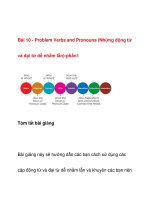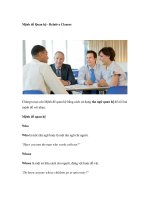9832 relative clauses and pronouns
Bạn đang xem bản rút gọn của tài liệu. Xem và tải ngay bản đầy đủ của tài liệu tại đây (116.8 KB, 3 trang )
Relative Clauses and Pronouns
Relative pronouns:
The most common relative pronouns are:
Pronoun
Who (subject) whom (object)
Which
That
Whose
When
Where
Why
Note: What is not a relative pronoun.
Use
Refer to people
Refers to things
Refers to people/things
Possessive of who/which
Used after nouns referring to time
Used after nouns referring to a place
Used to refer to reasons
Relative pronouns replace the subject or object.
• People who live in glass houses shouldn’t throw stones.
• The vase, which I bought years ago, is very valuable.
Defining relative clauses:
1. Defining relative clauses define or identify the person, thing, time, place
or reason.
•
•
•
•
He is the son of a woman who works in television.
That’s the man whose son is an actor.
Winter was the time when people tended to eat more beans.
I know where the play is set.
• I can’t imagine why she would want to marry you.
2. That can be used instead of who/which.
• The girl that (who) lives next door is blond.
• The sports centre that (which) is opening soon will have a
wonderful pool.
3. Relative pronouns can be left out if they are the object of the verb in
the relative clause.
• The person (who/that) I spoke to yesterday said it
would be ok.
• Sue bought the watch (which/that) she had seen.
4. No commas are used before and after the relative clause.
Non-defining relative clauses:
1. Provides extra information which can be omitted.
2. Commas are used before and after the relative clause.
3. That cannot be used instead of who/which.
• The museum, where you can see Roman pottery, is free.
• The witness, who refused to testify, was killed by the
murderer.
Prepositions in relative clauses:
1. They can come before the relative pronoun or at the end of the
relative clause (depends on whether it is formal/informal).
• The person to whom I spoke told me the hotel had
been destroyed. (formal)
• John, who I bought my car from, is a cheat and a liar.
(informal).









